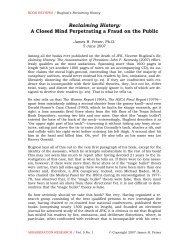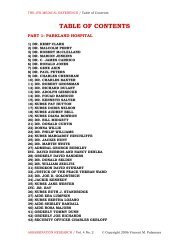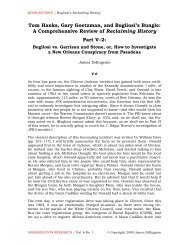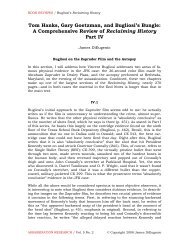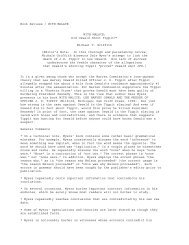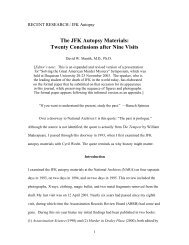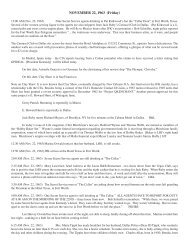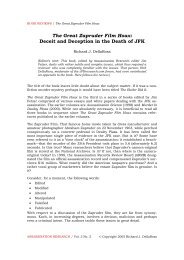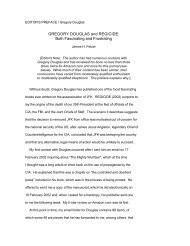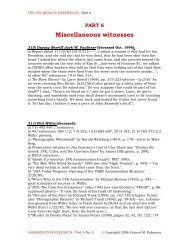A Comprehensive Review of Reclaiming History Part VIII
A Comprehensive Review of Reclaiming History Part VIII
A Comprehensive Review of Reclaiming History Part VIII
Create successful ePaper yourself
Turn your PDF publications into a flip-book with our unique Google optimized e-Paper software.
James DiEugenio 12 Bugliosi’s Bungle, <strong>Part</strong> <strong>VIII</strong><br />
John McCloy’s widowed mother made a middle-class living by being a hairdresser<br />
for the upper class wives <strong>of</strong> Philadelphia. As a youth, he first met the<br />
Rockefeller clan at a vacation resort in Maine (James Chace, “The Proconsul”,<br />
New York <strong>Review</strong> <strong>of</strong> Books, October 8, 1992). His mother saved the money<br />
to send him to Amherst, and then Harvard Law School. At Harvard he concentrated<br />
on corporate and commercial law. Upon graduation he was advised by a<br />
Philadelphia lawyer to go to New York to make his fortune. He did. He eventually<br />
worked for three famous Wall Street firms, ending up at Milbank, Tweed,<br />
Hadley, and McCloy. That firm did a great deal <strong>of</strong> work for the Rockefeller family,<br />
especially in their banking and oil holdings. One <strong>of</strong> McCloy’s early specialties<br />
was driving individual corporations into bankruptcy at the expense <strong>of</strong> holders <strong>of</strong><br />
common stock—a skill that he exercised in takeovers <strong>of</strong> railroads during the<br />
1920s. This, <strong>of</strong> course, would benefit families like the Harrimans—whom he also<br />
represented—since they owned the preferred stock, which could now be purchased<br />
by an allied family like the Warburgs, whom McCloy also represented. In<br />
other words, it was a socialist scam for the ultra-rich. But it allowed McCloy to<br />
became wealthy enough to marry into the class he served. He wed an heiress to<br />
the Phelps-Dodge copper fortune (see Chace, and also Jacob Heilbrunn, “The<br />
Real McCloy”, The New Republic, May 11, 1992).<br />
McCloy really made his name in the higher circles by winning the famous Black<br />
Tom Terminal case in international court against Germany. Employed by Bethlehem<br />
Steel, he reversed a judgment on appeal and showed that an explosion in<br />
New York Harbor in 1916 was a product <strong>of</strong> German espionage. In light <strong>of</strong> our<br />
subject, something else about his life at this time cannot be left out. In 1930,<br />
when working on this case for Cravath, Henderson, and de Gersd<strong>of</strong>f, McCloy<br />
became friends with Allen Dulles. Dulles headed up the Paris <strong>of</strong>fice <strong>of</strong> another<br />
powerful Wall Street firm, Sullivan and Cromwell. So when the two joined forces<br />
on the Warren Commission, they had known each other for over three decades<br />
(Kai Bird, The Chairman, pp. 76–7). War Secretary Henry Stimson noticed the<br />
Black Tom case, and McCloy became Stimson’s assistant in 1940. It was that<br />
case, plus this appointment, that seems to have enamored McCloy <strong>of</strong> his two<br />
later preoccupations: national security and espionage (McCloy was one <strong>of</strong> the<br />
very few who had access to the famous MAGIC intercepts prior to 1942).<br />
While at work for Stimson, McCloy was involved in two very questionable decisions.<br />
The first was the infamous Japanese internment on the West Coast. He<br />
played a key role in implementing this disgraceful episode. There was a dispute<br />
between the Justice Department and the military over whether Japanese–<br />
American citizens should be rounded up, many <strong>of</strong> their belongings forfeited,<br />
their lives disrupted, and then detained in isolated camps. McCloy came down<br />
on the side <strong>of</strong> the military. How unsupportable was McCloy’s decision?<br />
Even Hoover recommended against it (Bird, p. 149). Some argued that it was<br />
unconstitutional: since most were American citizens, they deserved due<br />
process. McCloy shot back with one <strong>of</strong> the most ill-advised quotes in memory:<br />
“If it is a question <strong>of</strong> the safety <strong>of</strong> the country or the Constitution <strong>of</strong> the United<br />
States, why the Constitution is just a scrap <strong>of</strong> paper to me.” (Heilbrunn, p. 42)<br />
It was this kind <strong>of</strong> attitude towards the law which made other Roosevelt advisers<br />
like Harold Ickes say things such as the quote above (Bird, p. 161). But that<br />
wasn’t all. Once the over 100,000 American citizens were in detention, McCloy<br />
ASSASSINATION RESEARCH / Vol. 6 No. 1 © Copyright 2009 James DiEugenio



